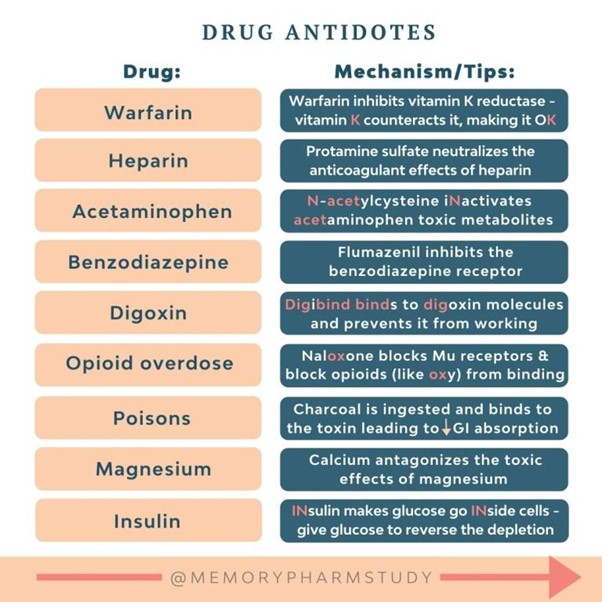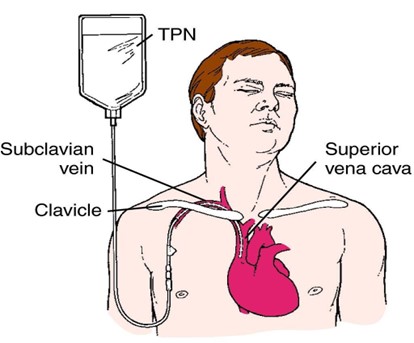A nurse is caring for a client who is receiving diazepam as sedation for an endoscopy, Which of the following antidotes should the nurse have on hand during the procedure?
Naloxone
Atropine
Flumazenil
Neostigmine
The Correct Answer is C
Flumazenil is the antidote for diazepam, which is a benzodiazepine. Flumazenil is a selective antagonist that can reverse the sedative effects of benzodiazepines and is commonly used in cases of benzodiazepine overdose or to reverse sedation after procedures.
Naloxone (A) is the antidote for opioid overdose and would not be appropriate for reversing the effects of diazepam.
Atropine (B) is an anticholinergic medication used to increase heart rate and is not specific to the reversal of diazepam sedation.
Neostigmine (D) is a cholinesterase inhibitor used to reverse the effects of non-depolarizing neuromuscular blocking agents and is not indicated for reversing the effects of diazepam.

Nursing Test Bank
Naxlex Comprehensive Predictor Exams
Related Questions
Correct Answer is D
Explanation
A. Intake and output: Monitoring intake and output is essential in the postoperative care of a client to assess fluid balance and kidney function. However, it is not the priority assessment when the client has received isoflurane in the PACU. The priority assessment in this situation is related to the potential cardiovascular side effect of isoflurane, which is hypotension. Hypotension can have immediate and significant implications for the client's perfusion and overall well-being, requiring prompt attention and intervention.
B. Non-verbal pain cues: Assessing for pain is important in the postoperative period to ensure adequate pain management and comfort for the client. However, it is not the priority assessment when the client has received isoflurane in the PACU. The priority assessment at this time is related to the potential cardiovascular impact of the anesthesia, which is blood pressure. Addressing hypotension takes precedence over pain assessment as it poses a more immediate threat to the client's well-being.
C. Bowel sounds: Assessing bowel sounds is part of a comprehensive postoperative assessment to monitor the return of bowel function after surgery. While it is important, it is not the priority assessment when the client has received isoflurane in the PACU. The priority assessment in this situation is related to the potential cardiovascular side effect of the anesthesia, which is blood pressure. Monitoring and managing hypotension is of greater concern in the immediate postoperative period.
D. Blood pressure: This is the correct answer. The priority assessment for a client who received isoflurane in the PACU is the blood pressure. Isoflurane is an inhalation anesthetic that can cause hypotension (low blood pressure). Monitoring the client's blood pressure is crucial to promptly identify and address any hypotension, as it can lead to inadequate tissue perfusion and oxygenation. Addressing blood pressure deviations is essential for the client's cardiovascular stability and overall recovery in the PACU.
Correct Answer is B
Explanation
When caring for a client receiving a continuous infusion of total parenteral nutrition (TPN), the nurse should implement the intervention of checking the client's blood glucose level regularly. TPN is a highly concentrated intravenous nutrition solution containing glucose, amino acids, lipids, vitamins, and minerals, and it is used to provide complete nutrition when the client cannot take oral nutrition.
Monitoring blood glucose levels regularly is essential because TPN is rich in glucose, which can significantly affect the client's blood sugar levels. Hyperglycemia (high blood sugar) is a potential complication of TPN infusion. Regular blood glucose monitoring allows the nurse to detect and address any changes in blood sugar levels promptly and to adjust the TPN infusion rate or administer insulin, if necessary, to maintain the client's blood sugar within the target range.
Let's go through the other options:
A. Change the TPN infusion tubing once every 3 days: While changing the TPN infusion tubing regularly is a good practice to maintain asepsis and prevent infection, it is not the priority intervention in this situation. Regularly checking the client's blood glucose level is more crucial to monitor the effects of TPN on blood sugar levels.
C. Insert the peripheral IV catheter for administration: Total parenteral nutrition is a hypertonic solution that can cause irritation and damage to peripheral veins. It is usually administered through a central venous catheter (CVC) placed in a large vein, such as the subclavian or jugular vein. Inserting a peripheral IV catheter for TPN administration is not recommended due to the risk of vein damage and thrombosis.
D. Monitor the client's weight every 3 days: Monitoring the client's weight is an important part of assessing their nutritional status and fluid balance. However, the priority intervention for a client receiving TPN is checking their blood glucose level regularly, as hyperglycemia is a common and significant concern in TPN administration.

Whether you are a student looking to ace your exams or a practicing nurse seeking to enhance your expertise , our nursing education contents will empower you with the confidence and competence to make a difference in the lives of patients and become a respected leader in the healthcare field.
Visit Naxlex, invest in your future and unlock endless possibilities with our unparalleled nursing education contents today
Report Wrong Answer on the Current Question
Do you disagree with the answer? If yes, what is your expected answer? Explain.
Kindly be descriptive with the issue you are facing.
